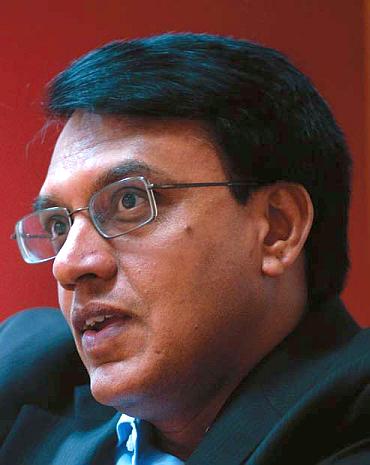
Dream big, identify what needs to be done and just do it!" advises Srikantan Moorthy, VP and Head (Education and Research Initiatives), Infosys, who manages Campus Connect, an engineering college engagement programme
by Infosys.
In a freewheeling conversation with Mahesh B Sarma, Tan (as he is popularly known) discusses what makes students more employable, the importance of soft skills, and what it takes for success in the IT industry.
What according to you makes a student employable?
The core capability we focus on is the learning ability of the individual. It is the ability to get generic learnings from the problems faced by them and further take those solutions to new problems faced by them. This is what we call "learnability".
All of these become things that you learn and use as required. Therefore, the ability to learn exists while today you might be programming in JAVA and tomorrow you will have to programme perhaps in DOT NET, and two years from now there might be a technology where neither of the two exists.
It is important to have flexibility in the thought process.
Do communication and team skills put students from rural colleges at a disadvantage? Your comments.
No. Take for instance, the ability to work well in teams. There are team projects, which can be devised either by the institutions or by students. I don't see a reason why students can't get together and do community service. It would be one medium through which team work can go on. And while serving the community you get a hang of the reality outside.
The faculty must have the willingness and exposure to make students more employable. But at the core, it is all about a change in mindset.
How do you assess learnability?
The primary criterion for recruitment at Infosys is academic qualification and marks scored (consistency). Then we conduct analytical tests, which determine their learnability to some extent. People who have come here passing through that gate have demonstrated significant learnability.

Is there a link between high percentage in the qualifying examination and performance in the competitive tests you conduct?
Not much. Both 80 per cent and 90 per cent by themselves, may or may not indicate a certain problem solving
capability. The kind of education that our students get promote and reward 'rote learning' abilities. Hence you might score 90 per cent in such a system, but learnability, a crucial attribute may be actually missing.
How much does a branch count in your selection process?
There is some correlation. But it depends on which college you come from. Quality of teaching in engineering subjects differs drastically from one institution to another institution. If the basic knowledge of computer science graduates from a particular institute is not significantly high then a mechanical engineer from the same institute might almost be on par in terms of his ability to scale up, if both the individuals have cleared the screening process.
In our education system, teaching happens from a concept perspective and not much from the application perspective. As long as you possess learnability and logical thinking, your disciplinary background is not a constraint for performance.
Could we then say that even a BSc graduate with learnability skills would serve the purpose as good as a BE?
I think the way to look at it is from what the job demands from Day 1. You may come from different kinds of backgrounds and training. Today, the demands of the clients have increased significantly and nature of work is changing remarkably.
The engineer makes the difference with the extent of depth and diversity he or she would bring to the solution.
The value from four years of engineering education stems from the exposure one gets with respect to the complexity of systems. When one looks at complexity here, it is the nature of parameters that one needs to think through, the broad picture or perspective I need to have and the rigour with which one would solve a problem. And that makes a huge difference when you are conceptualising solutions.

For a company like Infosys, which operates across verticals, would having an employee pool with diverse backgrounds be an asset?
Yes, it is. As client demands become more and more sophisticated, the skill sets that an automobile engineer would bring to the process of software development in the automotive industry, would be very different, from somebody who is, say, a mechanical engineer. Also, when somebody who has gone through circuit branches (computer science), he or she would be much more useful to a firm developing products for the telecom vertical.
In that case would you say that when students look for jobs in IT, they must always look at companies that have clients in their own area of specialisation?
It is no longer true that solutions can only come from one discipline. Therefore, the multidisciplinary nature of solutions and the pervasive nature of IT plays a major role. IT is embedded in everything you do. What you get from the education is the rigour, logical thinking, understanding of the complexity and the ability to put together solutions.
All these can be useful if you are working in that domain but at the same time it's not useless specifically if you are working in that domain. There is diversity happening in the world on the application of IT. The pervasiveness of IT demands that people working in IT are from a diverse background. Hence, there is a multidisciplinary application.
Are industry certifications such as Oracle, CCNA, Veritas and MCSE, valuable for securing employment?
At the campus recruitment level we recruit people not on the basis of any of these certifications. It is based on their engineering degrees, and their ability to ace the selection process. At the lateral recruitment stage, if somebody applies to a company, which has clients with particular software application needs, then an appropriate certification would have an edge. But having a certification by itself will not make much of a difference in this case.
Once an employee gets into a company, good firms do provide them with opportunities to upgrade their skills, continuously, which may include external certifications.
To get a job, what is of primary importance, is getting your attitude right. Dream big, identify what needs to be done and just do it. Move beyond 'me and marks', to 'us and our clients'. Work hard, the rest will follow.